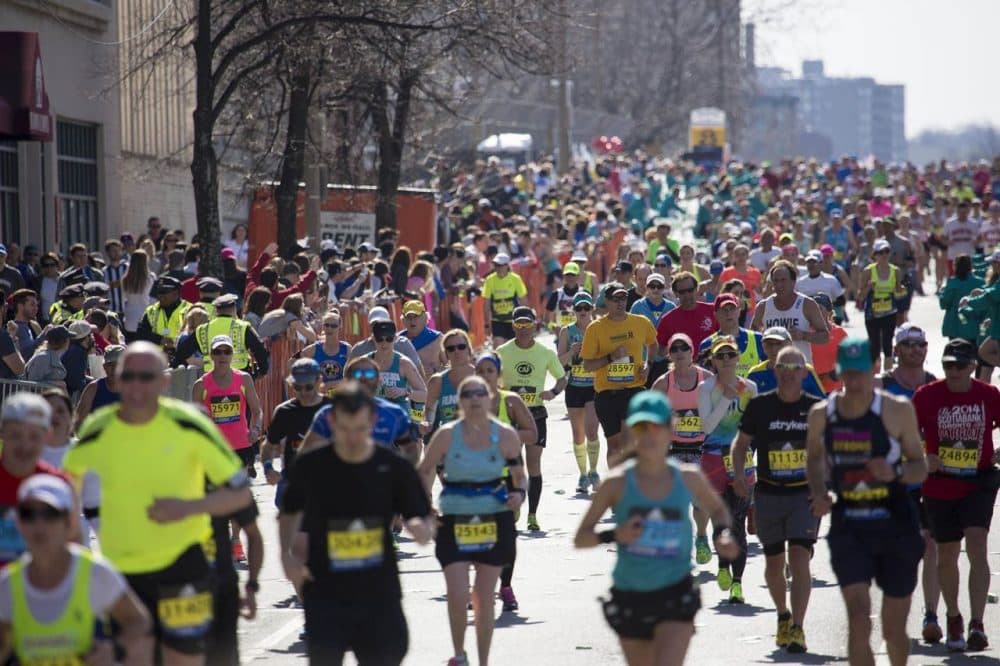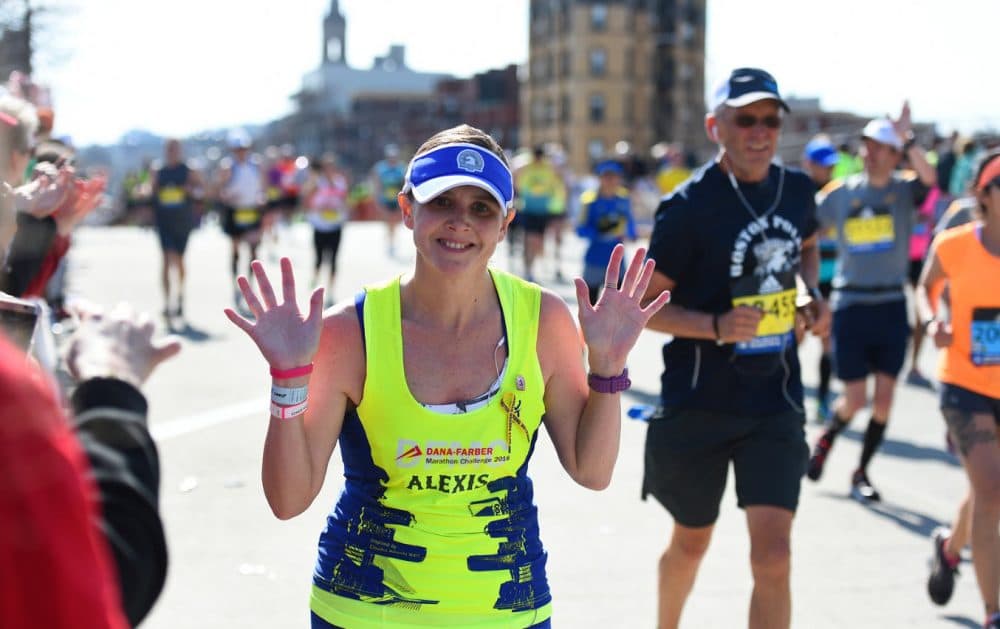Advertisement
Fitness Gains Persist Even Weeks After You Ease Off, Marathon Study Suggests
Resume
On Monday, Alexis Drzewiecki, Greg Welch and their teammates will be running the 26.2 miles of the Boston Marathon to raise money for the Dana-Farber Cancer Institute.
Last year, they volunteered for the public good in a different way: They stopped running.
In the months surrounding the 2016 Boston Marathon, they and 20 other runners participated in a Massachusetts General Hospital study on "detraining" — the physical effects of running less after the race. Researchers measured their physical condition at their fitness peak before the race, and then over the next two months as they ran far less.
The preliminary results carry an important message for runners and other endurance athletes, says Dr. Aaron Baggish, the study’s lead author and the director of the cardiovascular performance program at MGH.
"Rest and recovery after a marathon are not going to force you to lose ground," he says. "There's always a concern among runners that taking time off after they run is going to result in losses in health gains or losses in fitness. And what we saw is that, really through four and then eight weeks, a lot of the good benefits of running were still durable."
That's important, he says, "because people in the running community don't like to rest. This is a good reminder that they can, and they probably should.”
!["It was totally Rocky [IV]. Rocky meets science," says Greg Welch, one of the study participants. (Courtesy Greg Welch)](https://media.wbur.org/wp/2017/04/Greg-Welch-Study-1-1-1000x563.jpg)
Drzewiecki, who is running her fifth Boston Marathon this year, recalls what she endured a year ago, as she was tested on a treadmill that inclined ever more steeply.
“They would strap us into this very 'Star Wars'-looking mask, to gauge our breathing and our output," she says. "And they said, ‘Run as absolutely long as you can, and when you feel like you’re really going to drop, grab the handlebars and we’ll stop it.’ ”
Remember that training montage in "Rocky IV," where Rocky’s Soviet opponent, Ivan Drago, is hooked up to all those tubes and wires? That’s how Greg Welch felt.
“You hear the treadmill, ka-kink, ka-kink, it’s getting faster and higher and you’re over there breathing into this mask which -- yeah, it was totally Rocky. Rocky meets science."
Greg Welch
“You hear the treadmill, ka-kink, ka-kink, it’s getting faster and higher and you’re over there breathing into this mask which — yeah, it was totally Rocky. Rocky meets science,” says Welch, who is running his third Boston Marathon this year.
The participants in the study had blood tests and EKGs, and when they weren’t strapped into a mask and being monitored, they abided by the two-hour-a-week cardio limit. It seemed appealing at first.
“The first month was easy,” Welch says. “The first month, you’re like, 'Yeah, not a problem.' ”
“A month before the marathon you’re like, 'Heck yeah, no exercise, I can do that,' ” Drzewiecki says.
After a month of this detraining, though, they noticed some changes in their bodies. When Drzewiecki came in for her testing session four weeks after the marathon, it felt much harder.

“Compared to the first visit, where I felt like I was on that treadmill forever, I felt like I was struggling when they first started inclining the treadmill, and I definitely didn’t last as long,” she says.
Welch agrees: “Yeah, that was a struggle. You could tell you were working harder, your heart was definitely beating faster.”
Surprising Results
The participants' bodies did change, says Baggish.
“Probably the most dramatic changes that we saw were in the structure of the heart," he says. "We saw reductions in the size of the right heart by 10 to 20 percent in as little as eight weeks.”
But what's most striking about his findings is how much the participants' bodies and fitness levels stayed the same. That shrunken heart, for example, that had to affect their running, right?
“Probably not much,” Baggish says. “It probably is a reflection of the fact that the heart can oscillate within a given range and still be perfectly healthy, and still contribute to good exercise capacity.”
After eight weeks of easing off, the participants’ peak VO2 — or how much oxygen they can intake — didn’t change much, he says. So though participants like Drzewiecki and Welch felt less able to endure time on the treadmill after two months, that didn’t cause them to lose their cardio fitness gains, according to Baggish.
“A lot of athletes feel that after a week or so of rest that if they're not back at it, they're going to lose fitness, and that's just not really what we found.”
Dr. Aaron Baggish
“A lot of athletes feel that after a week or so of rest that if they're not back at it, they're going to lose fitness,'' he says, "and that's just not really what we found.”
So, the difficulty that Drzewiecki and Welch perceived during the detraining period was most likely in their heads. And the physiological benefits of all the training they did before the marathon lasted for at least two months, Baggish says: “We also found that some of the beneficial things that happened with marathon training, like improvements in cholesterol profiles, were durable at least through eight weeks of detraining.
“I'm a firm believer in everyone backing off very dramatically after a marathon for some period of time,” he says. “For some people it's a week, for some people four weeks, for some people it may be eight weeks.”
This study isn’t specific to just marathoners, he adds; it's likely generalizable other endurance athletes, including triathletes, cyclists and rowers.
His ultimate takeaway: “Rest is vital, and all of our measurements would suggest that rest is not counterproductive, that if anything, it's productive. "
Dr. Baggish and his research team have not published their study yet, but it was presented at the American College of Cardiology conference in March. They note some limitations: It didn’t adjust for their participants’ dietary intake. And they didn’t see what would happen after eight weeks of detraining. What if it had stretched to three months, or six? That’s for another study, Baggish says.
Meanwhile, Drzewiecki and Welch are back in top form and planning to run on Monday. And when it's over, they'll give their legs plenty of rest.
"After the marathon," Drzewiecki says, "it's more about the celebration and less about the miles."
This segment aired on April 18, 2017.